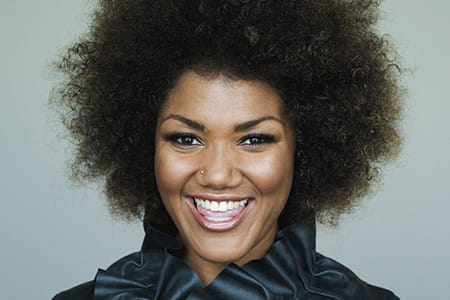At 34 years old, Canadian soprano Measha Brueggergosman—who grew up in Fredericton—has performed on the world’s greatest stages, including Carnegie Hall in New York; she has performed for Queen Elizabeth II and Nelson Mandela. Ever versatile, she recently joined the judging panel of Citytv’s Canada’s Got Talent, airing March 2012. She spoke with Saltscapes about her mother’s cooking, support from the people of Fredericton and her brush with death.

Q Did your family support your development as a singer?
A We’re not an affluent family, but my parents made it their mandate to discover the gifts of their children and develop them. They chose where we lived based on where we would have the most opportunities.
Q The people of Fredericton held fundraisers for you.
A There was an organization called “Friends of Measha” and every year I would sing a recital to raise money so I could go to university.
Q It takes a community to raise a child, they say.
A Yes, and when I have children, I’ll raise them in a similar community. My father was a city counsellor, the deacon of our church. My family has always been involved in community service.
Q Did you feel any racism growing up?
A I know my father very much did. It was painful for him. The Black Loyalists—Lawrence Hill’s book The Book of Negroes—is essentially the story of my family. My father created an environment of safety and love. He made it his goal to make sure we grew up shielded from that. A lot of that had to do with my church.
Q That was a Baptist church. Did you sing there?
A Yes, but I did the circuit: Wesleyan, Presbyterian, weddings, bar mitzvahs—you name it. I sang wherever people invited me. When you’re young, it’s not necessarily technique, it’s more about developing a relationship to music. I’m grateful I had so many opportunities to be in front of people.
Q What are your memories of Christmas?
A Christmas is a massive deal in my family. My mother had this red-green theme and it was a big deal when she switched to like eggplant and white. She always set up the house with the wreaths that she’d made and the hand-painted nativity scene. Our house always looked so beautiful. We had hand-knit stockings with our names on them. Our parents would wake up and we’d pray over the gifts. And the food!
Q So your mom can cook.
A She has the Gosman family traditions. Her hits are legendary: boiled ham, chilli and of course fiddleheads. My uncles would bring a salmon and my mother would bake the whole thing. My father-in-law still talks about the big salmon my mother made when he came over to Canada in 1995.
Q You spent five years at the Robert Schumann school in Düsseldorf, Germany. How did this affect your music?
A The minute I moved away, my stock went up. It happens especially in the arts: the fact that you have gone somewhere else tends to be interpreted as validation of your work when really, I was going to school to get better.
Q You underwent emergency open heart surgery a few years ago. Can you describe the emotional impact?
A For me, it was about getting back to where I was before the surgery, and that was when I could understand the miracle and blessing of having survived. I was thinking as I was going under, “It’s not like anybody would have accused me of wasting time or being lazy.” I was thinking, “If this is it, I’ve had a pretty good go of it.”
Q At 31 years old?
A Yeah, I’ve worked hard. I’ve always wanted a life I could be satisfied with, should it end at any moment—nobody would have said, “It was a shame she didn’t do more with her life.”
